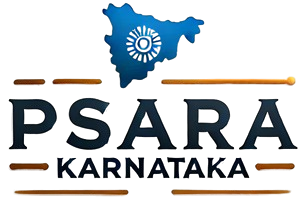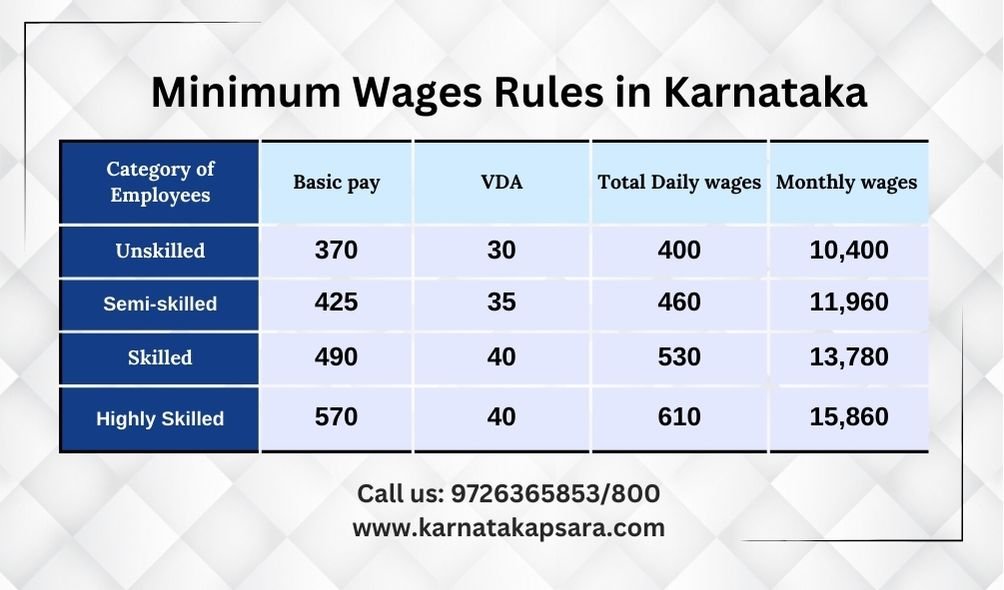Minimum Wages Rules in Karnataka
Are you looking for easy information about the Karnataka Minimum Wages Rules? These rules are made to ensure every worker gets fair and timely wages for their work. The Karnataka government decides the minimum wages for different types of jobs, based on skills and industries. The rules explain important things like how wages are calculated, working hours, overtime payments, weekly holidays, and legal deductions. Normally, an adult can work up to 9 hours a day, and if you work extra, you must be paid double the normal rate. Employers must also give salary slips, maintain proper records, and follow all guidelines to stay compliant. These rules protect workers’ rights, promote fair labor practices, and create a safe and transparent work environment across Karnataka.
Wages Rules: Easy Insights for You
Important Rules of Minimum Wages in Karnataka
The Minimum Wages Rules in Karnataka make sure every worker gets fair pay for their work. To begin with, the government decides the minimum salary for different types of jobs, depending on the skills and the industry. Moreover, they update these wages from time to time to reflect changing economic conditions. A normal working day is 9 hours, and a worker can work up to 48 hours a week. In case someone works extra, they must get double pay for overtime. Furthermore, every worker should also get one day off in a week without losing any pay. Employers must give proper salary slips, keep records, and only make legal deductions like taxes or PF.
Importantly, the rules also give essential protection to workers. For example, both men and women must get the same pay for doing the same kind of work. Employers must pay wages on time — usually by the 7th of the next month. Even if someone agrees to work for less, the employer must still pay at least the minimum wage set by law. Otherwise, if any employer doesn’t follow these rules, they can be fined or face legal action. Overall, these simple rules help protect workers, ensure fair pay, and create a better and safer working environment in Karnataka.a
Karnataka Wage System and Worker Categories Explained
In Karnataka, the wage system is made to make sure every worker gets fair pay based on their skills and the type of work they do. To ensure this, the government fixes minimum wages for different industries, and workers are paid daily, weekly, or monthly depending on their job. Moreover, if someone works more than the regular hours, they must be paid extra — double the normal rate as overtime.
To organize the workforce fairly, workers are divided into four main groups: Unskilled, Semi-Skilled, Skilled, and Highly Skilled.
Unskilled workers do simple jobs that don’t need any training.
Semi-skilled workers do work that needs a little training or experience.
Skilled workers are trained and do jobs that need special knowledge.
Highly skilled workers are experts who do important or technical work.
As a result, each group has a different minimum salary, depending on the difficulty of the work. Overall, this system helps protect workers, ensures fair wages, and motivates people to learn new skills and grow in their jobs.
Karnataka Labour Department’s Work for Fair Pay
Minimum Wages Rules in Karnataka make sure that workers are paid fairly and treated properly at their workplaces. The Karnataka Labour Department keeps an eye on businesses, factories, shops, and offices to protect workers from unfair wages and poor treatment.
What the Karnataka Labour Department Does:
- Sets Fair Wages
The department decides the minimum pay workers must get, based on their skills and the type of job they do. Wages are updated from time to time to keep up with the economy. - Visits and Inspects Workplaces
Officers regularly check workplaces to make sure employers are paying the correct wages. If they find any issues, strict action is taken. - Helps Workers Solve Problems
If workers don’t get their proper pay or face unfair deductions, they can complain to the Labour Department. The team works to solve the matter either by talking to the employer or taking legal action if needed. - Spreads Information
The department also runs programs to teach both workers and employers about their rights and responsibilities, helping everyone understand what is fair. - Checks Company Records
They make sure companies are keeping proper records of working hours, payments, and overtime, so everything stays clear and legal.
Karnataka Minimum Wages Update: Latest Rates by Category
Karnataka government updates minimum wages regularly to ensure fair salaries for all types of workers. The total wage is made up of Basic Pay and VDA (Variable Dearness Allowance), which is adjusted based on inflation. Different categories of workers — unskilled, semi-skilled, skilled, and highly skilled — have different wage structures.
Here’s the latest breakup:
Worker Category | Basic Pay (₹) | VDA (₹) | Total Daily Wage (₹) | Monthly Wage (₹) |
Unskilled | ₹ 370 | ₹ 30 | ₹ 400 | ₹ 10,400 |
Semi-Skilled | ₹ 425 | ₹ 35 | ₹ 460 | ₹ 11,960 |
Skilled | ₹ 490 | ₹ 40 | ₹ 530 | ₹ 13,780 |
Highly Skilled | ₹ 570 | ₹ 40 | ₹ 610 | ₹ 15,860 |
Important Notes:
- Basic Pay is the fixed minimum salary.
- VDA is added to adjust wages for inflation (price rise).
- Monthly wage is calculated assuming 26 working days.
- Rates may vary slightly based on different industries.
The Labour Department ensures that every worker is paid at least these minimum amounts. Employers must follow these rates strictly, or action can be taken against them.
Karnataka Latest Law Updates: Key Changes Explained
Workers Are Getting Better Pay
The minimum wages have gone up! Whether you do simple jobs or skilled work, you should now get more money for your hard work.Meanwhile, Government Work Is Now Online
No more standing in long lines. You can now apply for licenses, approvals, and other government services straight from your mobile or computer.In addition, Starting a Business Is Easier
Want to start your own business? Good news — the paperwork is quicker now. A new one-stop system helps you get everything done faster.Moreover, Labour Rules Are Being Strictly Followed
Government officers are checking workplaces to make sure workers are treated fairly and paid properly. If anything’s wrong, action is taken immediately.Similarly, Records Must Be Kept Digitally
Employers have to keep salary and attendance records online now. It’s cleaner, quicker, and makes everything easier during inspections.Finally, People Are Being Made More Aware
The government is sending messages, posters, and holding events so that both workers and employers know their rights and duties clearly.
How Workers Can Recover Unpaid Wages in Karnataka?
If you are a worker in Karnataka and have not received your salary, you have the right to take action. First of all, collect all important documents like your employment contract, salary slips, bank statements, attendance records, and any messages related to your payment. Next, start by talking to your employer or HR department — sometimes salary delays happen due to simple mistakes. However, if direct communication doesn’t solve the issue, you can file a complaint with the Karnataka Labour Department either online or by visiting your nearest Labour Office. They will investigate and try to settle the matter.
If that still doesn’t work, you can approach the Labour Court under Section 33(C) of the Industrial Disputes Act, 1947, but you must file the case within one year from when the salary was due. For even stronger action, you can also send a legal notice with the help of a lawyer who understands labour laws. Furthermore, the Karnataka Labour Helpline is available for help — you can call the helpline number, send a WhatsApp message, or email the department for support. In conclusion, always remember, every worker deserves fair and timely payment, and there are proper ways to protect your rights.
Fair Pay and Labour Law Compliance in Karnataka
Government is working hard to ensure that every worker gets fair pay and that companies strictly follow labour laws. To achieve this, the government regularly updates minimum wage rates across different industries to make sure workers are protected from underpayment. In addition, employers must pay wages on time, provide overtime payments when needed, and maintain safe and healthy workplaces. Moreover, labour officers also carry out regular inspections to check that businesses are following all the rules. Employers are required to keep proper digital records of wages, working hours, and employee attendance to make monitoring easier and more transparent.
If problems arise, such as delayed salary or unfair deductions, workers can file a complaint with the Labour Department, which looks into the issue and helps resolve it quickly. At the same time, Karnataka is also making efforts to raise awareness among workers and employers by promoting knowledge about rights and duties through messages, campaigns, and workshops. By focusing on strong action on compliance, encouraging digital systems, and emphasizing worker welfare, Karnataka is building a fair, honest, and supportive work environment for everyone.

